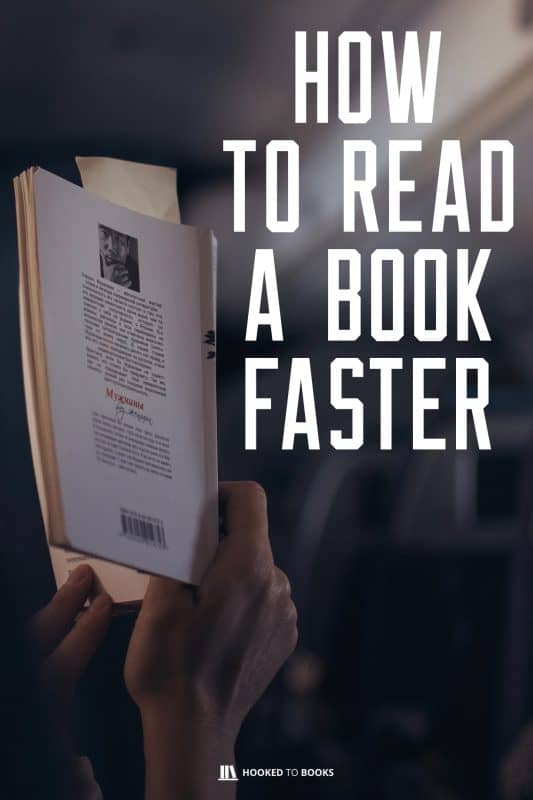When you have thousands of books on your reading list and free time is scarce, being a slow reader can feel like a curse. How do you fit in that 500-page book when your responsibilities are stacking up higher and higher and you can only squeeze 30 minutes of reading in before bed?
What you need to do is: learn how to finish reading a book fast.
Speed-reading is something many people view skeptically. You don’t want to skim a text and only comprehend half and then forget the entire book a few hours later because it didn’t sink in.
Let’s be real — that’s counterproductive and doesn’t seem purposeful or enjoyable at all.
Being a bookworm isn’t just about reading fast, slamming the book shut, and ticking another novel off the list.

How To Finish Reading A Book Fast?
You read because you love it and also want to better yourself. What you want is a way to preserve the pleasure of reading, but also utilize all precious minutes in today’s busy society.
And since none of us are about to get a fairy godmother who’ll just wave a wand and, bam, increase our reading speed by 100%, I’ve put together some real tips on how to finish reading a book fast.
There’s no reason you can’t maintain comprehension and power through that endless to-be-read list. We want our cake and we’re going to eat it too.
1. Make Sure Your Environment Is Conducive To Focusing
No matter how good a book is, it’s easy for your mind to wander and your eyes to bounce all over the page if the background noise is distracting you.
Relaxing at a coffee shop with a book and that latte seemed like a good idea at a time. And, yes! Still, do that if you like.
But the background chaos will drag your attention away from your text, so don’t expect to read fast in that environment.

If you minimize distractions, your reading time will be way more productive. You’ll read faster and maintain focus on the content.
Try reading in a quiet room or, if you don’t have that option, put on headphones with either soft white-noise playing and or use them to block out the sounds around you.
2. Stop Pronouncing Words In Your Head
When reading silently, we tend to pronounce the entire word in our head as if we needed to say them out loud. But good news! You don’t need to say the words out loud.
You can simply view the shape of the word, know what it is, and continue. Once you cut out that step of sounding out the words to yourself in your head, you can process words much faster.
A way to train yourself to cut out that “inner voice” is to try an app like Spreeder. It shows you one or two words at a time and you can increase the speeds.
This is just a demo version but gives you an idea on how to start training your mind. This will take focus to learn how to do since you’ve got decades of ingrained reading habits to unravel, but it’s very possible!
I was comfortably doing 600 words per minute while studies show the average reader comes in under 300 words per minute.
3. Skip Reading The Small Words

When presented with the concept of skim-reading, you tend to assume you need to skip whole paragraphs or just read every second sentence. That will make comprehension a nightmare.
Try, instead, skipping just the small words. We’re talking words like a, it, am, and the.
I did a fun test recently where you were given a paragraph with only the first and last letters of each word printed. The middle of the words was missing.
It’s still possible to read the entire thing because your brain automatically filled in the missing letters.
So don’t underestimate your brain’s ability to fill in the gaps! And this is much more logical than skipping whole paragraphs.
4. Read A Variety of Genres
The speed you read a book can also depend on what type of book it is. A dense epic-fantasy book with a 50-page prologue that details the intricacies of goblin history is not going to be as fast to whip through as a teen romance book.
If a book has an unfamiliar setting, you’ll need time to find your bearings vs a book set in modern times where it’s easy to find your footing.
A good suggestion is to rotate! Switch from biography to historical fiction books to sci-fi.
As we said earlier: being focused is the key. Being focused on the page is important, but also keep focused on the content too by keeping it fresh and ever-changing!
5. Use Audiobooks on 2x the Speed
I always sing the praises of audiobooks because they power me through my TBR pile even when I can’t curl up with a book in a quiet corner.
Jogging? Grab an audiobook. Commuting? Audiobook. Someone talking to you but you really wish they wouldn’t? Audiobook.
An average 400-page book in audio format can take up to 10 hours to listen to, which, definitely isn’t the definition of “speed reading.” But the good news is, most apps let you adjust the speed!
I listen to my audiobooks an old iPod Touch and the highest it goes is 2x the speed. I could still read faster myself, but my comprehension for audiobooks is 100x better.
No accidental skimming. You can find plenty of audiobook options on Kindle Unlimited too and we’ve got a guide on how to make the most of your subscription.
Audiobooks can help you read fast, but also read more books.
6. When You Finish Reading, Jot Down A Few Thoughts

Worried about your comprehension? This is a good test to see if you read that book super fast and absorbed it!
When you’re devouring book after book in rapid succession, it’s good to keep a little log of how you felt about them. Reading faster doesn’t mean you shouldn’t take moments of reflection.
We want to enjoy books here, and we want to cherish the stories we get to experience. We also want to analyze and dissect books.
There is no right or wrong way to enjoy reading!
You can also put your thoughts into book reviews and post them online in places like Goodreads or Amazon. If accountability helps you read more, you could consider joining or even starting a book club.
Finding a community, whether through reviewing or buddy-reading books, is key to helping you read more books altogether. It keeps your enthusiasm blazing.
7. Isolate The Sentences As You Read
Our eyes have a tendency to flit all over the page, especially if a paragraph hasn’t held our interest or we’re feeling pressured to read fast, fast, fast.
It’s easy to find yourself rereading sentences, which then, in turn, slows you down.
Try putting a ruler under your lines as you read. This blocks off the next sentences and keeps your attention on the sentence at hand. You’ll find yourself going faster and faster.
This is also about retraining yourself to read in a more focused and logical way without your eyes darting all over the page.
8. As They Say: Practice Makes Perfect!
Ever since 2013, I started logging how many books I read per year. It started off as 50 and then slowly began to climb as I hit 200 books in a year, then 250 and finally 300. (I have a vague goal of reading a book a day for the whole year! It hasn’t happened yet, but I’m ambitious.)
Obviously, in 2013 I couldn’t fathom reading 300 books. I couldn’t have fit it into my day’s schedule or believed I could read faster. Like any other skill set, you work at it and your comprehension and swiftness will increase.
It takes time and purposeful practise to read books faster. All things you can definitely achieve!
The best way to read a book is to firstly to enjoy it, but add in a good environment for focusing, dedication and concentration, and you’ll be reading faster in no time.
How To Read A Book Quickly: FAQs!
Q1. Can you read a book in a day?
Ans:- You definitely can! Plan your day specifically with this goal in mind.
Break up your reading sessions into manageable chunks so you stay focused on the text (utilize those aimless 5 minutes while waiting for something and read another chapter!) and boost your reading speed with the above tips in this article!
Q2. How long does it take to read 100 pages?
Ans:- It takes me under an hour and I find I read the finales of books faster than the beginning (since you’re already embedded in the world and the tension and pace have amped up by then) so a 300-page book takes around 2 hours to read.
Depending on the book’s content and accessibility, it can take longer. I also review everything I read to ensure I’ve absorbed the story.
Q3. Do you get faster the more you read?
Ans:- Absolutely. Even though each story you read might be new, you still get faster with practice as you grow familiar with the act of reading.
A beginner reader will painstakingly sound out all their words, while a person with a decade of constant reading under their belt will whip through in no time.
Enjoyed This Article? You May Also Like:
- 100 Best Books of All Time
- Falling In Love (Again and Again) With Books
- The Best Free Ebook Readers for Android and iPhone
About the Author
CG Drews is a YA book blogger with the goal to read every book in existence. She’s aiming for immortality for this. When not reading, she writes novels and blogs at paperfury.com.



